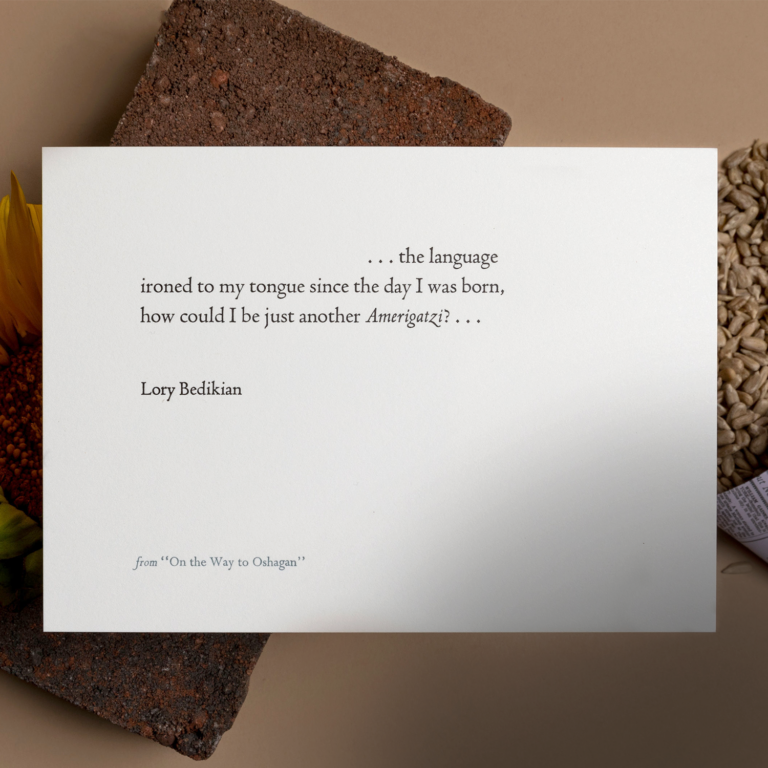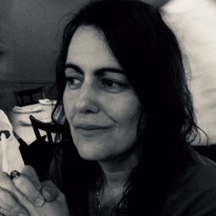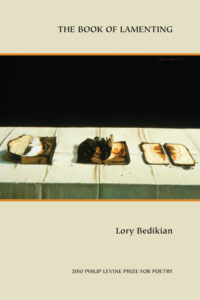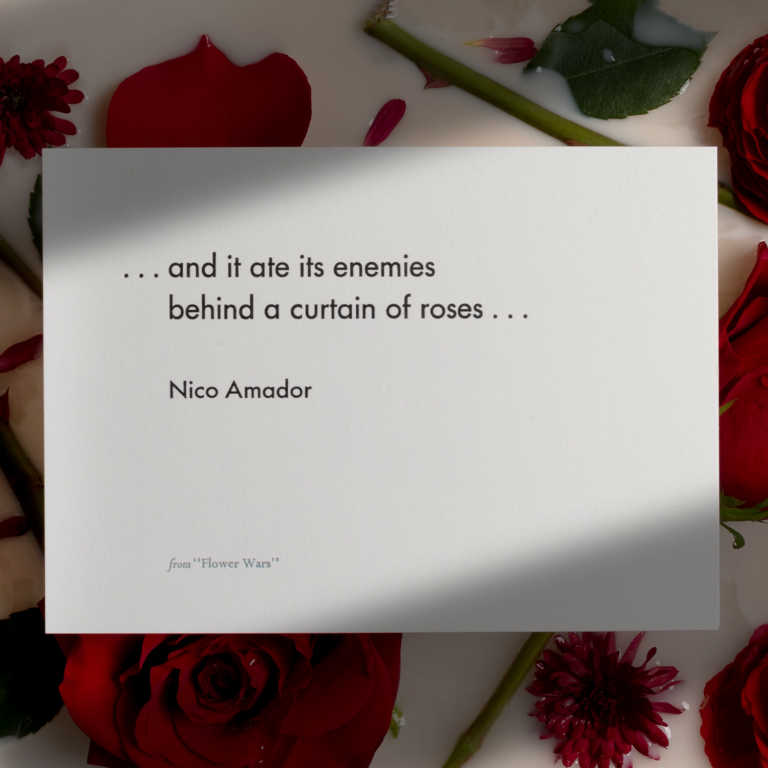Lory Bedikian
On the Way to Oshagan
The exile’s return to the motherland is the theme around which Lory Bedikian’s poem “On the Way to Oshagan” circles. She, a proud Armenian, stops by a roadside stall on a trip to her home country; and is immediately understood as an Amerigatzi, even though she’s speaking Armenian, not English. The poem could end with this awkward exchange, but instead pushes through, and a connection occurs between the returned-departed and the never-departed: there’s a gift, an invitation, and a bridge across exile.

Letterpress prints by Myrna Keliher | Photography by Lucero Torres
Guest

Lory Bedikian received her BA from UCLA with an emphasis in Creative Writing and Poetry. She earned her MFA in Poetry from the University of Oregon, where she received the Dan Kimble First Year Teaching Award for Poetry. Bedikian's The Book of Lamenting won the 2010 Philip Levine Prize in Poetry. She currently teaches poetry workshops in Los Angeles.
Transcript
Pádraig Ó Tuama: My name is Pádraig Ó Tuama, and I grew up in County Cork. And as far as we know, in our family, going back generations, there’s only people from County Cork and County Kerry in the family. But of course, along the way, there’s family members who went away: to the United States, to England, to South Africa, I think. And so families like mine are always filled with poetries and literatures of people who stayed and people who left, the diasporic experience filled with the sadness, and the hope, and the dream of survival by staying or going.
[music: “Praise the Rain” by Gautam Srikishan]
“On the Way to Oshagan” by Lory Bedikian:
“I stop the car, cross the dirt road
to see what the old woman’s selling.
Hoping for a cold drink, an extra
postcard to write this evening, I find
her tucked behind a table, under a tarp,
fly swatters swaying above her head.
Stacks of Marlboro boxes, packs of gum
are the only things I recognize among
the odd Russian, Armenian labels.
She must not hear me, because she keeps
rolling a square of newspaper into a cone,
fills it with roasted sunflower seeds.
I ask for one, saying ‘meg hahd hahjees,’
fumbling to find a dram among my dollars.
Her eyes, the color of two almonds
rise for only a moment before she asks
with a low, coarse, parrot-voice
if I like America, if I’m married and where
exactly is this place called ‘Glendale?’
With an awkward smile I drop indifferent
answers for her, like coins in the palm.
Until this exchange I had convinced myself
that I do not look like a tourist. After all, having
an ancestral name, firm family tree, the language
ironed to my tongue since the day I was born,
how could I be just another Amerigatzi? I say
this to myself, though I’m the one with the walking
shoes, the camera, the plaid-patterned pants.
She interrupts my thoughts with ‘Welcome
to Armenia. Please take these seeds for free.’
When I extend the money, I notice her face
shrinks in the afternoon light. Back in Los Angeles
I would have insisted to pay. But with this unexpected
visit I simply remembered how I was raised,
before the textbooks, the corporate cubicles,
before I learned to get fashion magazine
haircuts, attend culturally sponsored events.
I hear my parents say, ‘Love this seven-member family
all your days and nights, learn to take every offering
with grace, no matter the given size.’
I bow my head, say thank you. She insists
it’s nothing, asks that I come back soon.
Forgetting why it was I stopped at all,
I walk back across the dirt, cracking
one open. Its shell tastes of the same
salted seeds tucked by my grandmother
into coat pockets for evening walks.
Like a small communion, I contemplate
the seed with my tongue and swallow.
I almost turn to wave, but get back
in the car. For miles around, there is nothing
but land I follow on the map.
There is nothing but this old woman
and her convenience stand
made of brick and woodon the edge of a beaten road.”
[music: “The House You Wake In” by Gautam Srikishan]
I’ve had so many friends who have grown up in a country where, in their family, there’s talk of the old country. And I love this poem as an experience of going back to the old country. I find it so interesting, so moving, so complicated, going back speaking the language fluently — ironed onto my tongue, is how she says it — but yet, when you go back to the old country, you might feel like you’re new, or you might feel like somebody’s automatically going to know that you were brought up somewhere else; that your accent in the language, or your composure, or the way you dress, or a way that you carry yourself, somehow communicates that you are from another place, too. There’s sadness in it.
But there’s also profound connection in this poem. Initially, she’s perhaps reluctant or resistant to engage properly, because she’s embarrassed by her Americanness, Amerigatzi, being pointed out to her. But Lory Bedikian then begins to realize that this person, this woman by the side of the road in the convenience stall, is drawing her in. And she says to her, Come back, after she’s given her the gift. She wants the encounter to continue. Or maybe she wants to give Lory Bedikian the possibility of paying for the second time she gets something from her — first time’s free, second time, you can pay, provided you come back. But even that is a certain engagement, too.
And I find that this poem doesn’t veer down the typical road of saying, Oh, I went back home, and I felt rejected. This is saying, I went back to the old country, and I felt rejected, and yet in the midst of that, there was a new kind of belonging, a new kind of connecting that drew her back, then, to her American experience — the invitation, the instructions given to her by her parents about always accept a gift, never try to pay for a gift, as well as, then, the recollection of about how her grandmother used to carry those toasted seeds in her pockets for walks, perhaps sharing them with grandchildren
For her to take that seed on her tongue was like a sacramental experience. And so somehow, even though she felt like she was looking like, sounding like, feeling like a foreigner in a place where her family’s from, she still felt like there was an experience of transcendence, something of spirituality in this lovely encounter between herself and this woman at the side of the road.
[music: “A Little Powder” by Blue Dot Sessions]
The poem starts off by leading us into an experience where a returning Armenian is in Armenia and is experiencing what it’s like to be perceived as a visiting American, who happens to speak Armenian. And that could’ve been the poem, to speak about that kind of exilic experience, that dual experience; the fitting in but not fitting in.
And then this lovely encounter happens between the two of them, herself and the woman at the convenience stall. But in a certain sense, this is a kind of gift. Something has been communicated, to say that Lory Bedikian is Armenian-speaking, and has America in her, too. And by offering this cone of seeds as a gift, there’s a test, to say, Do you understand the culture, too? And she does. She passes this test, in a certain sense, and is brought back to herself, brought back to the lessons she’d learned from her parents and the walks she took with her grandmother and the taste of those seeds on her tongue.
[music: “A Little Powder” by Blue Dot Sessions]
One of the things that this poem is really intelligent about is the fact that the diaspora experience is a complicated one — that you belong to two, and maybe even three places. You belong to the old country, you belong to the new country, and you belong to the way that the old country in the new country experiences itself, too. Growing up, it was really rare among my friends to have parents who were from anywhere else. My grandfather was from the neighboring county, County Kerry, and I felt quasi-interesting because I felt like I had something more exotic than just Cork in my family background.
And as young people, we’d go to St. Patrick’s Day parade sometimes and see Americans walking in the parade, dressed in plaid trousers and waving at everybody and wearing basketball sneakers. And we thought they were hilarious. And we were waving at them, laughing at them, but also embarrassed, because they had money to fly back to Ireland. We didn’t have money to go on a holiday anywhere, around Cork or Kerry. And so the returning diaspora can be filled with a certain kind of nostalgia, filled with a way within which they do fit in; but also, their immigrant experience is imagined to be moneyed or luxurious, when often it’s anything but.
The diaspora community hold all that within them. They hold their belonging to the place that they have always grown up hearing about, the place that they visit, the place that they then return to the home that they did grow up. It’s a kind of exile. It’s a kind of tension. And the recognition that their accent has changed a bit might always be the first thing that people in the old country say to you. And that surely must be a difficult thing. I’ve stopped, now, trying to pay attention to people’s accents when they come back to Ireland and speak about, you know, having Irish parents, because if I’m in a conversation with somebody who has a connection to Ireland as the old country, I don’t want the first thing that I say back to be about how somehow, they sound like they don’t belong.
[music: “Outstretched Hand” by Gautam Srikishan]
I think the intelligence of this poem is that it could have been a poem that spoke about the initial awkwardness of asking in Armenian for something, and then being asked immediately what part of America you’re living in, and the awkwardness of that. But Lory Bedikian allows the poem to stretch further. It doesn’t allow the poem to just stop at the awkward experience, but asks: and what happened then? And what happened then? And what happened then? And she holds it all together brilliantly, by including all kinds of furniture in this poem. This poem is a very visual poem, where what she can see is very present, everything from those stacks of Marlboro boxes and packs of gum and the Russian and Armenian labels.
And then, down at the end of the poem, it finishes by saying:
“For miles around, there is nothing
but land I follow on the map.
There is nothing but this old woman
and her convenience stand
made of brick and wood
on the edge of a beaten road.”
So much is happening in this poem, between two people, and it’s so located in the small things that are being sold from this convenience stand on the side of the road. You can be there. You can see it, in a certain sense. You can almost smell the smell of the seeds, or taste them, too. This poem is powerfully located in what can be observed, what can be sensed, what can be touched, what can be experienced. And in that, so much culture is held.
[music: “Bivly” by Blue Dot Sessions]
“On the Way to Oshagan” by Lory Bedikian:
“I stop the car, cross the dirt road
to see what the old woman’s selling.
Hoping for a cold drink, an extra
postcard to write this evening, I find
her tucked behind a table, under a tarp,
fly swatters swaying above her head.
Stacks of Marlboro boxes, packs of gum
are the only things I recognize among
the odd Russian, Armenian labels.
She must not hear me, because she keeps
rolling a square of newspaper into a cone,
fills it with roasted sunflower seeds.
I ask for one, saying ‘meg hahd hahjees,’
fumbling to find a dram among my dollars.
Her eyes, the color of two almonds
rise for only a moment before she asks
with a low, coarse, parrot-voice
if I like America, if I’m married and where
exactly is this place called ‘Glendale?’
With an awkward smile I drop indifferent
answers for her, like coins in the palm.
Until this exchange I had convinced myself
that I do not look like a tourist. After all, having
an ancestral name, firm family tree, the language
ironed to my tongue since the day I was born,
how could I be just another Amerigatzi? I say
this to myself, though I’m the one with the walking
shoes, the camera, the plaid-patterned pants.
She interrupts my thoughts with ‘Welcome
to Armenia. Please take these seeds for free.’
When I extend the money, I notice her face
shrinks in the afternoon light. Back in Los Angeles
I would have insisted to pay. But with this unexpected
visit I simply remembered how I was raised,
before the textbooks, the corporate cubicles,
before I learned to get fashion magazine
haircuts, attend culturally sponsored events.
I hear my parents say, ‘Love this seven-member family
all your days and nights, learn to take every offering
with grace, no matter the given size.’
I bow my head, say thank you. She insists
it’s nothing, asks that I come back soon.
Forgetting why it was I stopped at all,
I walk back across the dirt, cracking
one open. Its shell tastes of the same
salted seeds tucked by my grandmother
into coat pockets for evening walks.
Like a small communion, I contemplate
the seed with my tongue and swallow.
I almost turn to wave, but get back
in the car. For miles around, there is nothing
but land I follow on the map.
There is nothing but this old woman
and her convenience stand
made of brick and woodon the edge of a beaten road.”
[music: “Praise the Rain” by Gautam Srikishan]
Chris Heagle: “On the Way to Oshagan” comes from Lory Bedikian’s book, The Book of Lamenting. Thank you to Anhinga Press, who gave us permission to use Lory’s poem. Read it on our website, at onbeing.org.
[music: “Praise the Rain” by Gautam Srikishan]
Poetry Unbound is: Gautam Srikishan, Erin Colasacco, Eddie Gonzalez, Lilian Vo, and me, Chris Heagle.
Our music is composed and provided by Gautam Srikishan and Blue Dot Sessions.
This podcast is produced by On Being Studios, which is located on Dakota land. We also produce other podcasts you might enjoy, like On Being with Krista Tippett, Becoming Wise, and This Movie Changed Me. Find those wherever you like to listen, or visit us at onbeing.org to find out more.
Books & Music
Recommended Reading
The On Being Project is an affiliate partner of Bookshop.org and Amazon.com. Any earnings we receive through these affiliate partnerships go into directly supporting The On Being Project.







